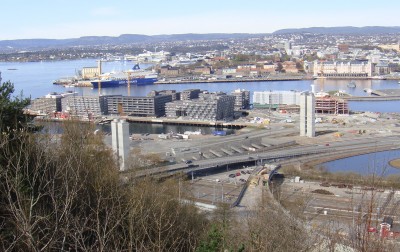Vacancy rates are rising and leasing rates falling in the commercial real estate market in and around Oslo, with experts claiming that’s an early warning of tougher times ahead. Neither the governor of Norway’s central bank nor the country’s finance minister are overly concerned about an economic slowdown, but others claim it’s now being felt nationwide.

Office vacancy rates have been rising in Norway’s oil capital of Stavanger and in Bergen for some time, with 10- and 9.5 percent of both cities’ available space now standing empty. Newspaper Dagens Næringsliv (DN) reported this week that nearly 1.3 million square meters of office space is currently available in Norway’s four largest cities.
It’s the rising amount of vacant office space, and a subsequent decline in leasing rates, in west Oslo, Bærum and Asker that’s causing the most concern, reported DN. Leasing rates in the area encompassing Oslo’s Ullevål and Smestad districts, Fornebu and Asker have fallen 27 percent in the past six month, and for Oslo as a whole, they’re done 9.3 percent, according to fresh figures from analysis bureau Arealstatistikk.
“This is the first warning,” Thomas Due, leader of Nordea Næringseiendom, told DN. “When rates are falling this much in the zones around Oslo, it’s a sign of what can hit the downtown areas eventually.” Due also noted that while quarterly variations may not be so serious, “two quarters in a row with a downturn can indicate a shift.”
‘Just the beginning’
New vacancies in prime office space along the busy E18 highway between Oslo and Drammen have also raised eyebrows within the commercial leasing market, just like rising unemployment rates are worrying economists. “Now we’re seeing the ripple effects coming after the oil price dive and what the economists have seen on a macro basis,” Due told DN. “There are many companies that live indirectly off oil.”
Frode Gyland of DNB Næringsmegling Stavanger agreed that “we’re seeing general price-pressure, with (rate) declines of 5- to 7 percent since last year.” Haakon Ødegaard of the commercial real estate brokerage Malling & Co said many commercial office building owners fear lower leasing rates. The entry of some major international investors into the commercial market in Norway has kept prices of commercial real estate high, but leasing rates are falling.
Many other real estate brokers confirmed the trend reported by DN, while the chief economist at Swedbank, Harald Magnus Andreassen, says the falling lease rates are “just the beginning” of a downward trend. He told DN that the office market is among the first to be hit by the slowdown in Norway’s important petroleum sector, so it’s a good economic indicator.
Central bank boss ‘not very worried’
The board of Norway’s central bank, though, refused to lower interest rates at its most recent opportunity to do so, claiming that they saw some positive economic signs and didn’t think a rate cut was necessary to stimulate activity. “I’m not very worried about the Norwegian economy, and not for the labour market either,” Olsen told newspaper Aftenposten earlier this month. He doesn’t think the jobless rate will jump, even though others think a slowdown in labour migration is disguising real unemployment.
Finance Minister Siv Jensen also continues to claim that Norway, which has had a booming economy for many years, doesn’t face any crisis. The government’s revised state budget that she presented last week drew positive response from several Norwegian economists, and she echoed Olsen’s remarks in noting that the rise in unemployment so far “isn’t especially high compared with our own history or other countries.”
Economy ‘needed a break’
Jensen also noted a rise in insecurity for those directly affected, though, and dipped once again into Norway’s oil reserves to bolster the budget in key areas such as welfare services offered by local governments. Steinar Juel, chief economist at Nordea, called the revised state budget “responsible” and “appropriately boring” in uncertain times.
Olsen went so far at to suggest to a packed lecture hall of students at the University of Stavanger earlier this month that it may be a good thing that oil prices took a dive last year. He said that “stimulated us” to boost efforts to diversify Norway’s economy, to make it less dependent on oil and gas.
“What we’ve experienced the past 15 to 20 years (in terms of economic development) is without parallel,” Olsen told the students. “I dare to say that no generation will experience anything like it again.” Klaus Mohn, a professor of economics who earlier served as Statoil’s chief economist, agreed: “I think it’s good for the Norwegian economy to take a break,” he said.
newsinenglish.no/Nina Berglund

